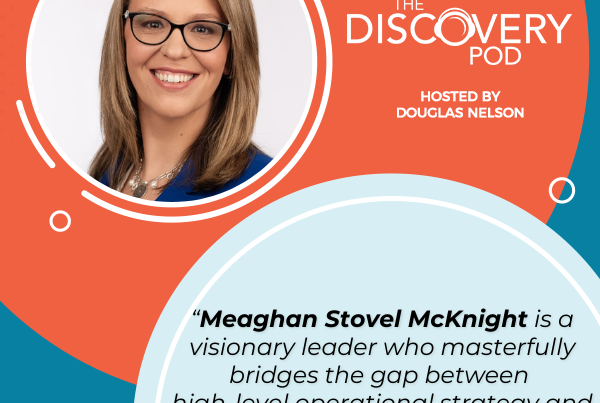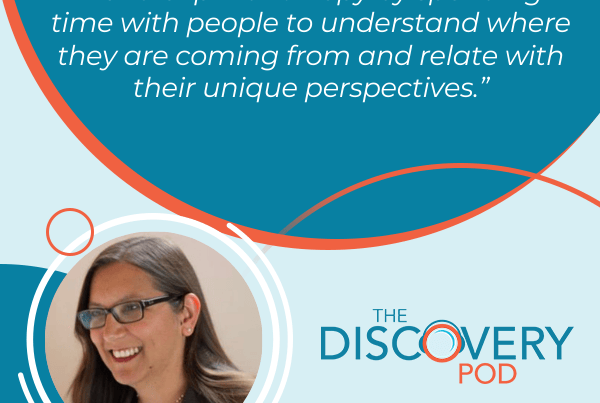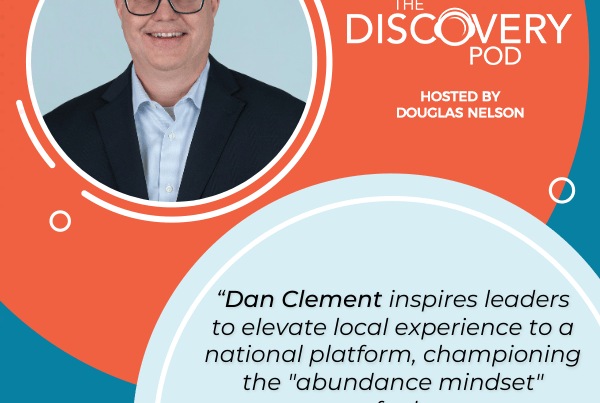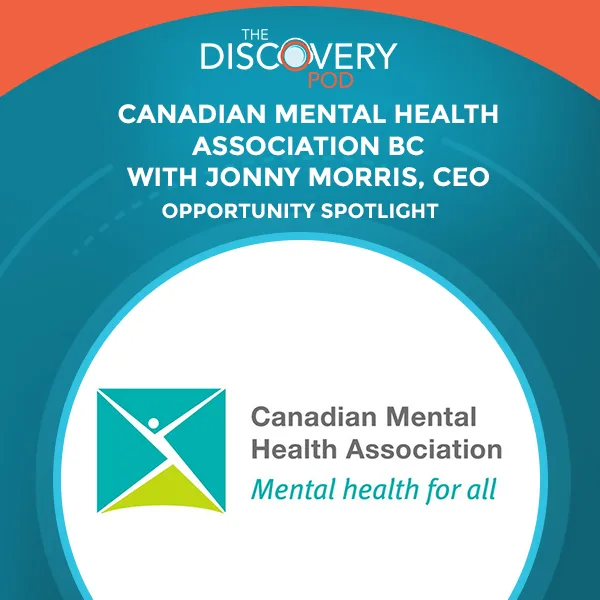
Leading transformational change in mental health care—are you ready to be part of it?” In this episode, Christoph sits down with Jonny Morris, CEO of the Canadian Mental Health Association, BC Division (CMHA), to discuss the critical new role of Director of Fundraising and Communications. Jonny shares the vision behind CMHA’s work, the personal passion that drives him, and why this inaugural position is an exciting opportunity to shape the future of mental health in British Columbia. Learn what it takes to succeed in this leadership role and be part of a team making a profound impact.
—
Listen to the podcast here
Canadian Mental Health Association BC With Jonny Morris, CEO
I’m pleased to have Jonny Morris with me. Jonny is the CEO of the Canadian Mental Health Association, BC Division, which we’ll be referring to as CMHA, I’m sure. We’re going to talk about the exciting role of Director of Fundraising and Communications that we’re working together on recruiting for. Welcome, Jonny.
Thanks so much, Christoph, for having me on this show.
I’m sure you’re sick of it, but it’s so tempting to make a here’s Jonny joke, but I won’t do it. I won’t go down that road.
No, it’s never gotten old.
CMHA BC
All right. It feels like a bit of a dad joke to me, but we’ll stay away from that one then, shall we? Jonny, I really appreciate everything you’re doing in the community and your support, both personally and professionally, for mental health. You’ve had such an illustrious career in the sector, but I want to talk specifically about CMHA. Let’s start there. For someone who doesn’t know much about it or is just learning about it, maybe you can talk about the great work that CMHA BC is doing and what it’s responsible for.
We often tell this joke. We often get confused with CMAH or the Canadian Mortgage and Housing Corporation. We’re not into those. CMAH does allied work in Toronto. CMHA is a national charity. We’re one of the most established charities in Canada. We have this becoming the more unique structure of being a federation. We have a national office, we have divisional offices where, and I sit in one of those here in British Columbia.
We have regional branches here in BC. We have fourteen of those branches. Of course, the division. At the division, we’re focused on three major strategic pieces of work, the change we want to make in the world around mental health and substance use. First, we’re really focused on providing direct service. Some of our services literally reach millions of people each year, at least thousands of people.
We have a whole range of services focused on depression, anxiety, and crisis care. We also care deeply about training and education and reducing stigma. We do significant work in schools and colleges, universities, and workplaces, all in an effort to make sure that people understand mental health, ill health, and substance use and know how to get help. Thirdly, we have an advocacy remit. We do a lot of work to advocate for and support the transformation of systems in BC when it comes to providing mental health care in hospitals, in the community, and across the province.
A Personal Work
That’s great. I like how you’ve focused on those three particular areas with the underlying theme or the overlying theme, for lack of a better term, is really helping people get support, helping those people that are advocates or champions for people within mental health crisis or people that need some assistance in the various areas that you mentioned. Why do you do the work you do, Jonny? What is your why? What has brought you to this space and what do you find compelling about the work that you and CMHA are doing?
It’s very personal work for me as a leader. What we used to say, the 1 in 5, and I think that that’s shifted now to be the 1 in 4, or sometimes even the 1 in 3. I come into this work very personally. I first discovered that I lived with depression in my early twenties, and it was a professor in the school when I was at UVic who really helped with a conversation to support me to access counseling and get the help I needed. I also have family experience of this as a family member.
For me, it’s very personal, the work in and around helping create change so that people living with a mental health or substance use problem can thrive, can flourish, get the help that they need when they need it, and also be free from stigma and discrimination. It’s very personal. I’ve been in community mental health now for almost 20 or 25 years, starting out in suicide prevention on Crisis Line. Community nonprofits or social profits, charitable work being in the sector is really in me both personally and professionally. It’s a place I very much call home when it comes to the work I do.
Thank you for being so open and sharing your personal situation there, Jonny. I appreciate that. As you said, hopefully, you’re experiencing it both in your work, professional, and personal life. I would hope that the stigma and the willingness to have these conversations are going up. Certainly, that’s a trend you would have noticed in your career. I’ve certainly noticed it, and I’m certainly not as immersed in it as you are.
I appreciate the work that you and others are doing, certainly. In your work so far with CMHA, I know you’ve been with the leader for a few years now, and you were previously with the organization in a different capacity. What are you most proud of? I know the organization has gone through some significant changes and growth in recent years in particular. When you reflect on what you’ve achieved so far, what really stands out for you?
This organization’s always had a really strong presence in the province. My predecessor, Bev, did some really, really important things around ensuring our programs, particularly bounce back and call the parents and driving kids and others. I have as broad a reach as possible. Really, in many ways, I set the place up before I took on the role to be strongly positioned to achieve mental health for all.
I’m really proud of the growth we’ve achieved over the past number of years against our strategic plan, our STRAP plan, which we approved just, it was a pandemic strategic plan cooked up during the pandemic, really, really striving towards broadening our reach, uplifting partners, and people with lived experience, and advancing the cause through data. We’ve really achieved great things against those three strategic pillars of work.
I would say I’m proud of the fact that we’re reaching more and more people with our direct services, our training and education, and also our advocacy. Also, I think the part that really stands out is with our strong partners in government and our strong partners in the community and elsewhere, we’ve been able to tilt the system toward meaningful transformation. We’ve launched innovative community-led crisis teams known as peer-assisted care teams. We’ve launched brilliant employment programs that are super evidence-based in primary care to help people with very severe mental illness find meaningful work and choose to stay in that work.
With our strong partners in government and in the community, we've been able to tilt the system toward meaningful transformation. Share on XWe’re also, I think, making a meaningful contribution in and around increasing access to supportive treatment and recovery beds as a funder on behalf of the government. We really are trying to live out our mission and vision in a meaningful way, even in trying to respond to being ahead of the curve by responding to climate change-related emotions and mental health problems as well.
That really does highlight something that I’ve been writing down a little bit here, that no one is immune in the broad reach mental health issues and concerns touch so many and the reach of your organization in responding to and being proactive in that is certainly to be commended. I’m glad you mentioned the partners as well because I don’t want to give the impression that you’re doing this alone by any means.
Working At CMHA
You have so many partners that you work with across communities and constituencies. That said though, I’m curious what makes you unique. In the social profit space that you call home, what is unique about CMHA when we think about some of the other organizations that you might be partnering with or that are in a similar space and working with mental health?
I think, in some ways, when I first took this job, it was important for me to hold a vision that we most certainly are not the only show in town. We really are stronger because of our coalitions and our alliances. What makes us unique and for people interested in working here is the breadth and depth of our mandate. For some, that’s tricky. You do have to prioritize and figure out where you want to apply your resources in the world. Our mission and vision that’s really based upon creating the conditions for people to experience good mental health.
We’re very interested in housing and employment and education. We’re very interested in doing what we can to advocate for the reduction of poverty. All of those pieces are really important for someone’s mental health and well-being. I think what sets us apart in some ways is that real emphasis on social conditions and marrying that up with delivering really innovative, transformative, accessible programs and services to help make a difference in people’s lives.
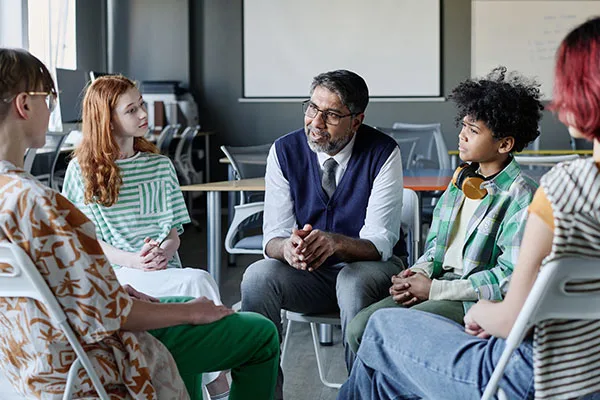
Canadian Mental Health Association: What sets CMHA apart in some ways is that real emphasis on social conditions and marrying that up with delivering really innovative, transformative, accessible programs and services to help make a difference in people’s lives.
You mentioned the working environment. Let’s pivot to the working environment, then. Tell me about the working environment at CMHA. Tell me a little bit about the culture and the work culture there. What is it you’re trying to create, and how would you describe it to someone considering joining you?
We are a tremendously engaged workplace culture by thinking all of our engagement. In all of our conversations with staff, people feel very connected to our vision and our mission. We have a lot of people like me who have a very real personal connection to this work, and I’d say that that’s felt throughout the culture in the organization. We are a hybrid workplace, so we folks work from home, and folks work from the office. We really try to cultivate meaningful and purposeful connections amongst staff and leaders across teams as much as we can.
In lots of ways, this person will have a key role to play in the ongoing strengthening of our workplace culture. We have two main offices. We have an office in Vancouver and an office in Victoria, and brilliant teams are sitting across those two offices. I would say if people who experience the work, whether at home or in the office, I think people can safely say most of the time if not all the time, today I’ve made a difference. I’ve made a shift and a change in the world when it comes to mental health and well-being.
Director Of Fundraising And Communications
That’s excellent. That connection to the mission that pervades an organization, it’s so important and it’s so gratifying and it’s to be HRE, but it’s so important for retention and succession and all the end recruitment and all this wonderful, but it just feels good to do that work and feel that way fundamentally, doesn’t it? That’s wonderful. Let’s talk about the work of the director specifically, then. What do you see this person doing and what do you think is exciting about the director’s responsibilities at CMHA?
It’s an inaugural role. That’s really exciting. It’s a brand new role, and it’s an opportunity to join up with really, really important portfolios of work, fundraising, and communications. Historically, these departments have been doing great work but separately from each other in the organization. We’ve identified an opportunity for these teams, and they’re great teams of very driven skill pressure that come together. The mandate for the inaugural director of fundraising and communications will be to bring these worlds together in a really good way, really leverage the opportunity between raising funds for the association to do our good work, but also linking that in a much more entwined way with how we tell our story.
How we engage our partners and service users in the community, and how we communicate internally and externally. It’s a great opportunity for a new leader to, in many ways, chart a new course with a fully joined-up department, working with very, very passionate individuals. Really, I think strengthening is something I really want us to do more of, which is to strengthen and harness our story as CMHA. What’s the story we want to tell in the world? How is the story we want to tell in the world linked to the change we want to make in the world? This incoming new director has a great opportunity to bring those worlds together.
There’s certainly an appetite, if I may add as well, for these changes and for this work to be done. Given the culture of philanthropy, we like to talk about a lot in regard to raising funds and having an organization think about philanthropy and the contributions that fundraising can make across the culture. You talked about some of the partners. I know you’ve got great partnerships with various levels of government that are how that have supported you for a long time, but there’s a great opportunity again to really leverage that support, that history, that credibility you have in some novel and exciting ways, too.
I think we’ve got some incredible philanthropy-focused folks who’ve given to us historically many times over the years and deepening our relationship with our donors and people who philanthropically give to the association is incredibly meaningful at this juncture in our journey. Looking for someone who can really hold those responsibilities and opportunities in a meaningful way is really exciting to me.
Thinking about the ideal candidate. What are we looking for in this person in terms of competencies, background and traits, if you will?
I’m looking for someone who can position themselves in this dual focus of internal and external to some degree. Someone who deeply cares about our mission and vision, that’s important to me. Someone who can connect to our mission and vision. Someone who might bring their own personal or previous professional connection to the change we’re making in the world.
I think someone who cares about and is very skilled at the ability to tell the story and provide a really rich and beautiful and powerful accounting of the activities we do and continue to share that story in a way that helps people feel comfortable and willing to give philanthropically to support our mission and our vision. I think having someone who knows the fine art of communications and strategic communications and can rely on the subject matter expertise within the organization.
I think someone who really values and believes in partnership and engagement and that we’re stronger together as a federation across BC with our fourteen partner branches and across the border. Someone who can really work, it’s a unique opportunity to work in a federation with the national and national offices, provincial offices, and regional branches. It’s a very unique skillset.
I think finally, someone who wants to be an internal and an external champion of building the healthiest culture we can have as an organization, someone who can be a champion for change and opportunity within and without. I think someone who can be proud of working for a really, really important organization in community mental health care, is the Canadian Mental Health Association.

Canadian Mental Health Association: The Director of Fundraising and Communications is someone who wants to be an internal and an external champion of building the healthiest culture we can have as an organization, someone who can be a champion for change and opportunity within and without.
This person, speaking of champions, they’re going to be working with you as a champion, as a leader. Tell me a bit about your leadership style, your management style. How do you envision working with this person, for that matter?
If you were to ask my staff and my team and my colleagues about my style.
I have, so I’m curious to hear how you describe it.
I would say I hold a lot of vision and think over time, or as I’ve settled more into this role by adding new staff, including a new COO my leadership style has started to transition to being much more strategically and externally focused. I really trying to look ahead and chart the course against the North Star of our work. I’d say people hang out with me; they’re going to see a style that’s very linked to our vision, our mission, and the change. I work with a tremendous amount of trust in the people around me. I really believe in and hold on to the sense that people come to work with tremendous skill and aptitude.
They can do a great deal of things in partnership with me and others. I create a lot of space for my team to really inhabit their work as fully as possible. I’m stepping toward how do we create feedback-rich cultures where we have that great balance of high achievement, high performance and lots of good accountability, and a safe place to work. What’s important to me is to create as much. We have to walk the talk. How do we create a psychologically safe and healthy environment to work in? That’s an ongoing piece of work for all of us in the organization.
That’s great. Fair enough. You’re very aligned with what people say about you too.
We’re good. We’d have a problem. We’d have a problem if I will.
The Future Of CMHA
I thought I’d get that out there for the record. Jonny, just in closing, thinking ahead and looking to the future of CMHA with this person, what excites you most about the future of CMHA? Why would someone want to come join you at CMHA in this exciting opportunity?
We are sitting at, I think, a point in history where we have a series of wickedly complex challenges and problems to respond to. When it comes to people’s mental health and well-being, we have ongoing public health crises in BC related to the toxic drug supply. We are seeing increasing rates of distress amongst young people, adults, and older adults. We are very aware of the incredible pressure on the health system. In many ways, we are one of, alongside our partners, one of the strongest and most available partners provincially in and around this work.
It’s a great opportunity for someone to be in this wave of change that we’ve precipitated. We’re not on the cusp of anything. I think we’re in the midst of leading transformative change forward when it comes to how we do mental health care. It’d be great to have someone who wants to be part of that wave, continue to sharpen our focus and ensure that we’re making the best change we can in the world. It would be great to have someone on board to do that with.
The CMHA is in the midst of leading transformative change forward when it comes to how we do mental health care. Share on XLet’s chat more soon. Let’s get the position profile and get the opportunity out in the world. Really appreciate your time, Jonny, leading transformational change is a great quote to end on and in what it is you’re trying to do and how this person can really support the work of CMHA. Thank you again for your time. Anybody that’s interested or curious or wants to know more, can feel free to reach out to me at any point, [email protected].
The CMHA website is a fantastic resource for learning more about your programs and services and more about you for that matter. Of course, the Discovery Group’s webpage has some of the source material as well for the search. Really looking forward to continuing our dialogue and exploration of some great director candidates for you, Jonny, and thanks again for your time.
Thanks so much, Christoph. I appreciate your great questions.
Thanks. Chat soon.
Chat soon.

